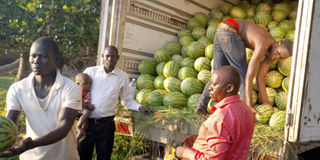Sheep and melons turned around his fortunes

Kenyan businessmen load watermelon at Julius Okello’s farm in Kumi District. Photo by Simon Peter Emwamu
About five kilometres from Angopet Village in Kumi District sits Julius Okello’s expansive land.
The more than 20-acre farm is a beehive of activity with various agricultural ventures that are accommodated neatly vying to catch visitors’ eyes.
On entering the compound, I was welcomed by the sight of healthy sheep and their lambs roaming freely as well as a beautiful orchard and well-trimmed lawns.
I find the politician cum farmer tending to his sheep on a Sunday morning.
Dressed in a white shirt, white hat and a pair of black trousers and gumboots, he takes me round the farm.
Mixed farming
Okello, who is also the deputy mayor of Kumi Municipality, has four acres of watermelon, two acres of sorghum, and three acres of fruits such as mangoes and oranges. But that is not all; Okello keeps sheep. He previously grew maize, oranges, and mangoes.
“I started farming in 2012,’’ says Okello, who began by growing sorghum and maize. “I ventured into other crops after realising that farming pays. Since then, I have never looked back.”
The astute politician says he and his wife saved money from their jobs to invest in farming. They kept ploughing back the profits into the agribusiness to reach today’s growth.
Harvest
Okello harvests the watermelon twice a week. He sells each watermelon to middlemen from Kenya at a farm gate price of Shs2,000. One would not expect him to get ready market in Kenya, which is the home of watermelons.
But Okello has found a niche and has a loyal customer base which gives him an average of Shs2.6m per tonne from watermelons. He says he prefers selling to Kenyans because of the reliable market and a better offer. Okello can harvest up to 30 tonnes of watermelon per season.
Sheep rearing
Not one to rest easy, the farmer decided to also venture into sheep rearing. He acquired some of his sheep from neighbours and others from a farmer in Soroti.
“I have started selling mature sheep to Kenyans,” he says. He sells sheep all-year round. “So many traders from as far as Mbale, Kampala and Kenya frequent this farm to buy sheep.’’
At farm gate, Okello sells the sheep at Shs100,500. He recently sold about 38, making Shs4m on the spot.
“Sheep rearing is more profitable because I do not incur transport expenses since buyers come to the farm,” he says.
Okello has partitioned the sheep sheds into several small cubicles, where the animals in groups of four spend the night, the day and feed.
The barn cost him Shs2m to erect. The floor is made of wood, but has spaces where the droppings pass to the ground, where they are collected for manure.
“It’s important to build a raised structure (a metre high) to protect sheep from contracting diseases such as foot rot,” he says, adding, that the animals need a clean environment.
What makes Okello tick?
So how does he handle all these ventures? “I do the marketing myself. I always go out to various markets to sell my products. I go as far as Busia and Kenya.” For this he hires two trucks.
Okello currently has five employees and employs casual workers whenever there is a lot of work to be done.
Challenges
“The main challenge is that mixed farming is labour intensive. I spend a lot on labour. During harvest period I have to engage as many as 10 workers.”
Last year, the dry spell in May killed the watermelons and some sheep, making him lose a lot.
Lack of expert assistance is another major challenge he faces. He says agricultural experts in the district have let him down adding that there are no reliable veterinary officers for sheep.
“Those employed at the county and Sub-county levels are either never in their offices or not willing to help.”
He says he has turned to magazines such as Seeds of Gold and other agricultural publications for advice.
Advice
Okello says mixed farming is more profitable and reliable as he does not depend on one product. Through this type of farming, he says his land is productive all-year round.
“Farming can sometimes be a risky affair. Your crops can be affected by bad weather or pests. Mixed farming offers alternatives in case of such failure,’’ he says.
Anthony Engwau, an agricultural extension officer in Kaberamaido, says mixed farming is the way to go in the region, which has for a long time depended on millet as a source of income.
“It is time farmers in Kumi diversified their farming. The decline of millet should awaken their interest in other crops. Because majority of farmers have large tracks of land, mixed farming can enable maximum utilisation of the land and can cushion them from weather challenges,” says Engwau.




